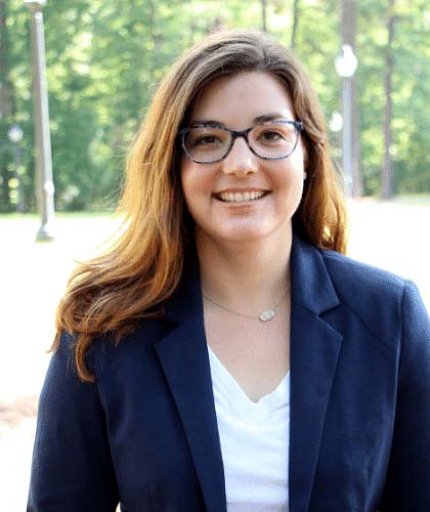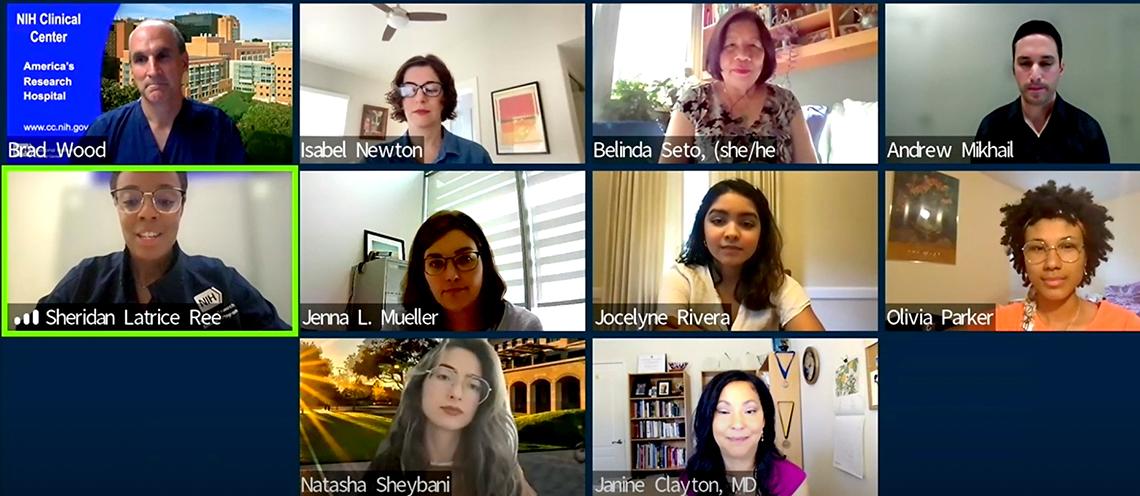Wait for Your Exit
Mueller Presents Different Perspectives of Mentorship

Yoda. Gandalf. Dumbledore.
Mentors in pop culture are often portrayed as wise, elderly figures (often men) who teach important lessons to their mentees. Dr. Jenna Mueller of the University of Maryland is neither elderly nor male, and is building a career as a successful researcher and mentor. She spoke recently in the Women Leaders in Academic Research series, giving a talk titled “Re-Thinking Mentoring: Perspectives from a Biomedical Engineer.”
Mueller is an assistant professor in the Fischell department of bioengineering at the University of Maryland, College Park, and a member of its Marlene and Stewart Greenebaum Comprehensive Cancer Center. Her interdisciplinary training places her at the intersection of global health and biomedical sciences. Her research focuses on cancer diagnostics and therapeutics via the use of low-cost, translational technologies that can be used easily in low- and middle-income countries.
She credits one of her first mentors with guiding her to her fields of interest.
A bioengineering major with a minor in global health at Rice University, Mueller found herself struggling to understand how engineering would prove useful in global health. Dr. Rebecca Richards-Kortum helped Mueller realize how bioengineering could be applied to help people and solve global health problems.
When the time came for Mueller to decide between graduate school and a career in the corporate world, she sought out Richards-Kortum’s advice again.
“A career in global health can be like a highway, with lots of potential exits,” Richards-Kortum explained. “If you’re unsure of what you want to do, one potential approach is to stay on the highway until you see the exit that you want, and then take it.”
The “stay on the highway” approach is what Mueller took. That brought her to Duke University’s biomedical engineering graduate program. She worked with both peer and faculty mentors at Duke as both a graduate student and postdoc.

“The process of learning from someone who’s one step ahead of you can be really valuable,” she said of her peer mentor Dr. J. Quincy Brown, who is now an assistant professor at Tulane University. Faculty mentors at Duke—including Drs. Nimmi Ramanujan, David Katz, Rebecca Previs and Tamara Fitzgerald—helped direct Mueller to her current pursuit of cancer research.
As a postdoc, she helped Ramanujan develop a “Pocket colposcope,” which is a smaller, more affordable and easy-to-use version of a tool used to screen women for cervical cancer and pre-cancer. “Getting to work with Nimmi on the Pocket colposcope and see a device transform from prototype to a commercial product has been an incredible thing to be a part of,” she said.
Throughout her talk, Mueller emphasized the importance of mentorship on career development. “Mentorship can play a powerful role, particularly in retaining women and minorities,” she stressed.
Female representation in biomedical engineering is close to equal in undergraduate populations, but plummets in master’s and doctorate programs. Having more visible female professionals may be encouraging to students. Good mentorship has been linked with benefits such as improved academic performance, social integration and sense of belonging and academic retention rates.
When it comes to finding mentors, Mueller recommended actively seeking them out. This may look like attending talks and initiating contact with speakers who interest you—that’s how Mueller started her relationship with Richards-Kortum.
Mentorship can mean different things to different people, Mueller cautioned, and your idea of what you need from a potential mentor might differ from what they have in mind.
“Instead of talking about mentoring and hoping that everyone means the same thing, let’s shift our thinking and our language and focus on these two questions: What do you need? And how can you get your needs met?”
Those who are seeking to become mentors themselves should think about their own values and what aspects of mentorship they found to be most helpful, Mueller advised. She also recommends the online training programs offered by the National Center for Faculty Development and Diversity that cover topics such as time management and building mentoring networks, and the NCI Team Science Toolkit.
Ultimately, she said, individuals should strive to seek out many mentors and become attentive and supportive mentors themselves.
“Pass on your inheritance,” Mueller advised. “Identify your passion and find or build the road to get there.”
The archived lecture can be viewed at https://videocast.nih.gov/watch=43873.
